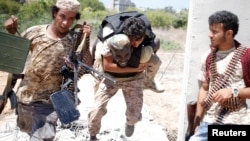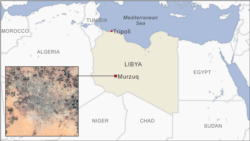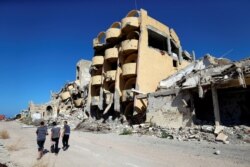An airstrike Tuesday on an Islamic State target in Libya killed 11 IS fighters, the U.S. military said.
The U.S. Africa Command (AFRICOM) said the airstrike near the southwestern Libyan town of Murzuq was carried out in coordination with the Libyan Government of National Accord.
"This airstrike was conducted to eliminate ISIS terrorists and deny them the ability to conduct attacks on the Libyan people," said William Gayler, director of operations at AFRICOM, using another acronym for Islamic State.
"This effort demonstrates the resolve of the U.S. and our Libyan partners to deny safe havens to terrorists," he added in a statement on Wednesday.
The U.S. conducted an airstrike in Libya last week as well. It was the first strike this year against extremist groups in the North African country.
That airstrike also targeted an IS-Libya affiliate near Murzuq, killing eight militants. The AFRICOM commander, U.S. Army General Stephen Townsend, said at the time that the attack was intended to "eliminate terrorist leaders and fighters, and to disrupt terrorist activity."
The deteriorating security situation in Libya in recent months has allowed militants affiliated with IS to expand their presence in the southern part of the country.
For months, troops affiliated with the Government of National Accord have been fighting forces led by strongman Khalifa Haftar, commander of the self-styled Libyan National Army. The fighting has left hundreds of people dead in Tripoli and in nearby cities and towns.
Experts say IS and other extremist groups have exploited the political chaos in Libya by asserting themselves in ungoverned spaces in the Libyan desert.
"IS, al-Qaida in Maghreb and other Islamic militant groups have a growing presence in southern Libya, benefiting from the political divide and lawlessness in the country," said Kamel al-Maraash, a Libyan affairs expert in Paris.
In late 2016, the U.S. played a major role in pushing out IS militants from the strategic Libyan city of Sirte, which was an IS stronghold for nearly a year.
In recent months, however, the terror group has claimed responsibility for several deadly attacks against Libyan civilians and military personnel.
Traveling from Syria
Reports say that between 500 and 750 IS fighters are active in Libya, but some experts contend the number is higher.
"I would stay at least 2,000 [IS] fighters operate throughout Libya," said Mahmoud Masrati, a Libyan journalist who closely follows militant groups in the conflict-ridden country.
"With the war on [IS] in Syria nearly over, many of the surviving terrorists there have managed to reach Libya. So, their number is growing significantly," he told VOA.
Masrati noted that IS fighters in Libya, who are mostly foreigners, also have established ties with other IS affiliates in Africa.
In an audiotape released this month, IS leader Abu Bakr al-Baghdadi called on his followers to carry out terrorist attacks in countries in Africa, without naming Libya.
Human trafficking
IS militants in Libya "have been running human trafficking cells in the south," al-Maraash said.
Since former leader Moammar Gadhafi was toppled in 2011, Libya has become the main conduit for African migrants trying to reach Europe via the Mediterranean Sea.
"In addition to indirect funding from IS leadership in Iraq and Syria, the terror group's Libya branch has heavily relied on this illicit business [of human trafficking] to fund its terrorist activity," al-Maraash added.
Continued U.S. efforts
Libyan officials say security forces have struggled to combat violent extremism in the country, despite continued global counterterrorism efforts.
"The battle against terrorism is still going on in conjunction with AFRICOM," Fayez al-Sarraj, prime minister of Libya's U.S.-backed government, said Monday at a conference in New York on the sidelines of the U.N. General Assembly.
"Our battle with terrorism will not end," he added.
Experts say the U.S. has a vested interest in continuing its counterterrorism strategy in Libya.
"Libya has become a major hub for terrorists, so I believe the U.S. will remain committed in its efforts to combat terrorism in Libya," al-Maraash said.






